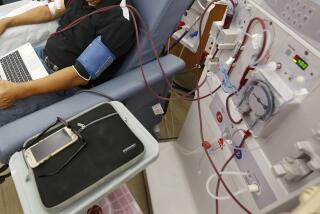Transplanting of 2nd Kidney Is Unethical, Panel Rules
- Share via
More than a month after a prison inmate made the unprecedented offer to donate his second kidney to his daughter, a bioethics committee at UC San Francisco decided Friday night that removing a living donor’s remaining organ would violate a physician’s code of ethics.
“We want to let other donors know that there are two people in any transplant, and we need to look at both,” said Dr. Wade Smith, chairman of the university medical center’s ethics committee. “There were nephrologists on the committee who see people on dialysis and who wouldn’t want to put one person on dialysis to help someone else.”
The decision stems from a debate pitting medical ethics against the right of parents to make such a sacrifice for their children.
Renada Daniel-Patterson, 16, and her mother, Vickie Daniel, learned of the decision late Friday.
‘Obviously she [Vickie Daniel] doesn’t support the decision,” said their spokesman, the Rev. Lorenzo Carlisle of the Oakland Community United Church of Christ. “If the child needed a kidney in the morning, we’d be protesting tonight at the hospital.”
Renada was born with kidney disease and has endured years of grueling dialysis treatments. Her father, David Patterson, donated one of his two kidneys to his daughter in 1996 while he was serving time at Folsom Prison for burglary.
But the transplant failed when Renada secretly stopped taking the medications necessary to keep her body from rejecting the organ. Late last year, her physician said that the kidney eventually would need to be removed.
In early December, Patterson stunned the medical world when he offered to donate his remaining kidney to his daughter, a move that would have increased his chance for infections and meant a future of dialysis treatments. Transplant surgeons at UC San Francisco were faced with the question of whether they could justify saving one life at such great cost to another, and brought the issue before the bioethics committee.
The situation appeared to become less urgent the week before Christmas when Daniel announced at a news conference that Renada had experienced a “miraculous” turnaround in her health. The physician, Dr. Donald Potter, a UC San Francisco pediatric nephrologist, confirmed that Renada was responding well to new medications but that she eventually would still need a new kidney.
Smith noted that the committee was not ruling specifically on Renada’s case because her mother wanted the decision to apply to all families in similar situations.
More to Read
Sign up for Essential California
The most important California stories and recommendations in your inbox every morning.
You may occasionally receive promotional content from the Los Angeles Times.













